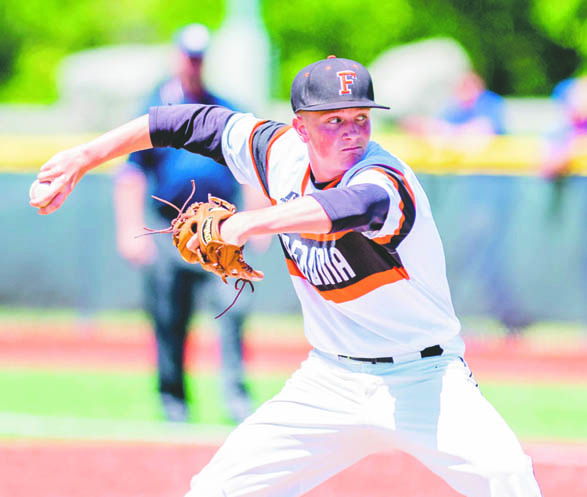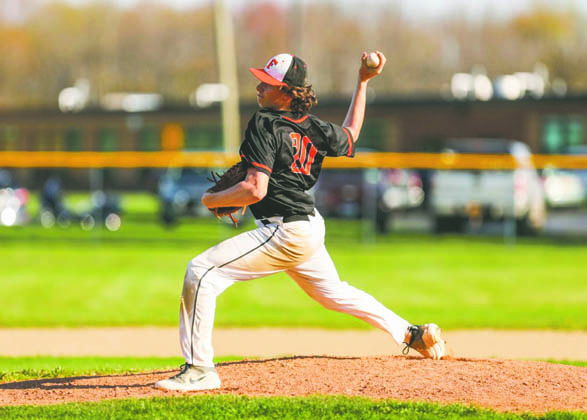The Observer
by Anthony Dolce
July 29, 2019
Walters, Tarnowski join Fredonia’s long lineage of stellar pitchers

Tarnowski was Fredonia’s shortstop while he wasn’t on the mound, but when he stepped on the mound, he gave every bit as much as his colleagues. Tarnowski ended his Fredonia tenure with a 14-3 record in 106 innings, holding his opponents to an ERA of 1.91 and a WHIP of 1.19. For a guy who wasn’t ever the technical number one of the staff, he sure pitched like a number one.
“Some kids don’t have that mental toughness, that don’t want to lose attitude. Reid has those,” Fredonia pitching coach Charlie LaDuca said.
Flexibility was, and still is, something Tarnowski is proud of. He was a guy who moved around every year, playing several different positions, and being successful at all of them. It’s indicative of his happiness moving around that his favorite, and perhaps most memorable moment at Fredonia didn’t even come with him on the mound.

Tarnowski was the one who scored the winning run in the top of the seventh inning in 2016 against Livonia in a Far West Regional game, hustling in from third on a wild pitch and helping his teammate Jarod Burmaster claim victory that day.
“I just wanted to help the team win. Whether it be moving a guy over with a bunt, or taking a grounder off the chest, I’d do whatever was needed” Tarnowski said.
Tarnowski, according to LaDuca, was limited in his baseball career from playing three sports, which led to him struggling with his secondary pitches, but it was something he worked hard on, and continues to work hard on at his new home of Pitt-Bradford. Pitt-Bradford, like Cam Voss and Burmaster, didn’t have original intentions of attending Pitt-Bradford, as he was first looking to attend SUNY Brockport.
He wasn’t even looking to play baseball.
“I wasn’t even thinking about playing college ball. I was on a summer team playing for the heck of it when the coach here called me and said to come for a visit. I came down and liked it,” Tarnkowski said.
Tarnowski has made the most of his opportunity down there, pitching to a 3.89 ERA in his freshman season where he was the team’s third starter, while also still getting a chance to hit and play the field a little bit. For him, he’s happy to just be playing.
“I like doing both. I’m partial to hitting and fielding, but I love pitching too. There’s just something about squaring up a baseball though. It’s a good feeling. You usually have to choose between pitching or fielding but I got to do both,” Tarnowski said.
Gullo noted that Pitt-Bradford is certainly using Tarnowski to his strengths of versatility and good attitude.
Tarnowski isn’t quite sure of what his goals are for baseball, he just wants to have fun doing it, and more importantly, wants to make sure his education isn’t jeopardized.
“I have to make sure to keep my grades up. … I’ll just see where baseball takes me. If I can take it to another level, I’ll take it to another level,” Tarnowski said.
LaDuca said Tarnowski had to work the hardest to get where he is, and while his success may seem the most surprising, LaDuca knew what he was capable of.
“His success is a tribute to finding a way to get the guy out. Others had more raw talent, but he had to work the hardest,” LaDuca said.
Now that Tarnowski, like the others, can focus on one sport and how to improve. Originally he was a little overwhelmed how time consuming it could be, but he’s eased in to his new role just fine. Tarnowski knows he still has some work to do when it comes to pitching, whether it be pitching to the corners or controlling his off-speed stuff, but he thinks his new home will help him get there.
“The coaches and other leaders took the freshman under their wings. I’m so comfortable here,” Tarnowski said.
While Voss, Burmaster, and Tarnowski have all gone on to successful collegiate careers, Fredonia’s most recent ace before Trey Swartz, Derrick Walters, has yet to take the mound at his new college.
Walters, like Voss and Burmaster, committed to NCCC to pitch, but, like Voss, an elbow injury kept him off the mound his first year, leaving Walters still unsure if he wants to continue pitching.
“I have inflammation in my elbow, and get really bad soreness once I start throwing. I’m still making up my mind,” Walters said.
If Walters never throws a collegiate pitch, it certainly won’t be for lack of talent. In his two years pitching for Fredonia, Walters threw 98 innings to a 15-3 record with an ERA of 1.35 and a WHIP of 0.85. He had one of the highest winning percentages in program history and one of the best strikeout totals in the last 18 years of Fredonia baseball.
Walters was born with the DNA to be a great pitcher, as his grandfather pitched in the minor leagues. LaDuca notes a lot of similarities between Walters and Voss.
“They’re tall and thick. Derrick is one of the only kids who’s hands are big enough to throw a true splitter. He has tremendous potential,” LaDuca said.
Walters has a nine inning performance against Depew and a no-hitter against Silver Creek on his high school ledger, neither of which should be surprising, as he was hitting 83 on the radar gun when he left Fredonia, and grew a lot in just his two years. Walters is someone with the perfect mindset on how to be excellent, while also being smart enough to recognize patterns.
“Changing speeds is the biggest thing at the high school level. You have to be able to locate pitches, and when you really need it, turn up a fastball. Having a trustworthy catcher helps too, which I had in Ryan Mroczka,” Walters said.
Even with the raw talent, Walters still had to put in the work, which he, like his predecessors did with efficiency. Walters wasn’t afraid to put in the necessary work.
“He’s very receptive. He gained a lot of ground by extending his strides and fixing his release points. Hitters saw different speeds because of that release point,” LaDuca said.
Now Walters faces the work of trying to make his way back from injury, if that is the path he chooses.
“I have to ice it pretty often. There are certain things I can’t do, certain angles I can’t extend to,” Walters said.
Walters isn’t a ‘ra-ra’ guy, nor is he very loud. He has his performances do the talking for him. It’s safe to say the hitters who would oppose Walters wouldn’t mind him staying home, and while he doesn’t know if he’ll come back, he certainly possesses the talent and work ethic to regain his recent dominant form. And if pitching isn’t in his cards, the field of sports management, Walters’ back up plan, will be lucky to have someone as gifted and hardworking.
One thing all four of these guys, along with Swartz, have in common are their roots — and it’s something they all acknowledge. They all pointed to how excellent of a leader coach Gullo is, and how much of a teacher LaDuca is. Fredonia is what taught them the leadership skills, winning mindset, and most importantly, the skills to get where they are, whether that be on the diamond or off.
Likewise, guys like these are what make coaching worth it to Gullo and LaDuca.
“The opportunity to be around these kids is tremendous. I wouldn’t take away time from retirement or my family if I didn’t enjoy the kids. I wouldn’t be wasting my time if it wasn’t worth it,” LaDuca said.
It is safe to say that whatever it was worth to LaDuca or Gullo, it was equally worth it to Voss, Burmaster, Tarnowski, and Walters. Their coaches saw their potential in them right from the beginning, and their successes haven’t come as a surprise to them. It shouldn’t be a surprise to anyone else either.
The additional financial assistance of the community is critical to the success of the Chautauqua Sports Hall of Fame.
We gratefully acknowledge these individuals and organizations for their generous support.











